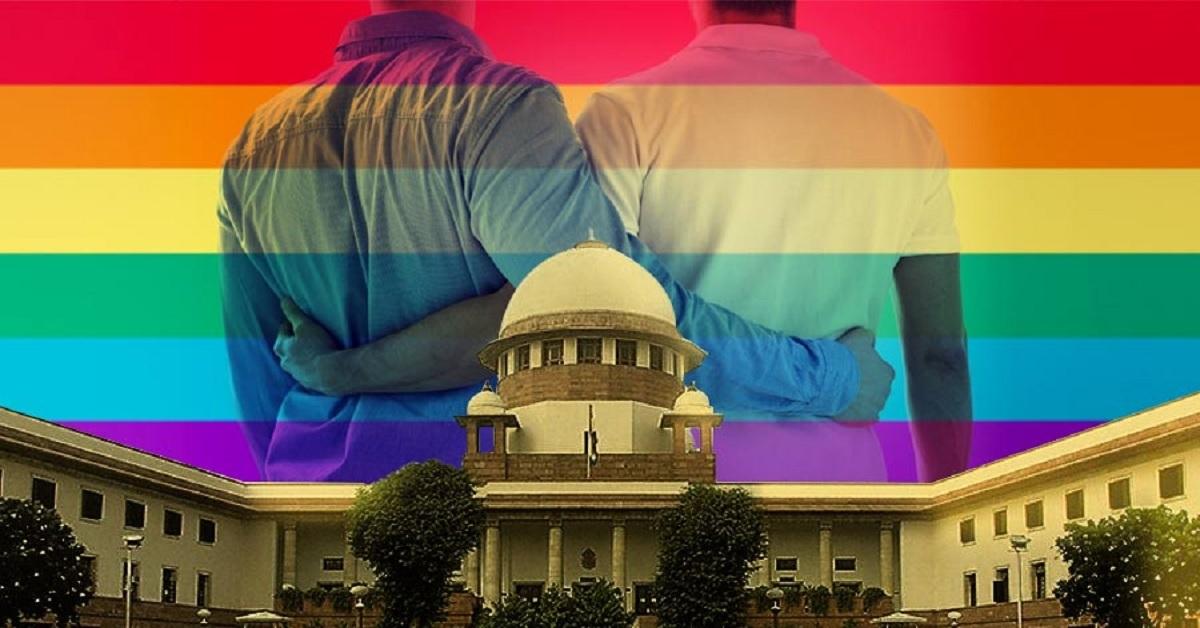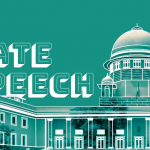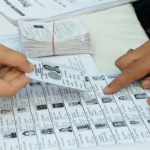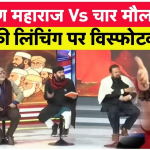
Do all Indians have the right to a civil union? Understanding the Marriage Equality Judgement – Part II This part in the series examines what India’s Supreme Court has said on the Right to enter into a Union and the contradictions on this issue in the verdict.
17, Nov 2023 | A Legal Researcher
The five-judge constitutional bench of the Supreme Court had delivered its judgement on October 17, 2023, in the case of Supriyo Chakraborty vs. Union of India [2023 INSC 920], stating unanimously that non-heterosexual marriages cannot be read within the provisions of Special Marriage Act, 1954 (SMA) and that there is no fundamental right to marry.
The judgement also states that transgender persons have the right to marry under the Special Marriages Act (SMA). The majority opinion by Justices Ravindra Bhat, Hima Kohli and P.S. Narasimha differed with the minority opinion of Chief Justice of India (CJI) D.Y. Chandrachud and Justice S.K. Kaul, on the issue of validity of adoption regulations that restricted unmarried couples to adopt children.
This article is the second part of a series that will explain and analyse the judgement with respect to different ways in which the judges reached their conclusions, the jurisprudence they created and sidelined, and the consequences of this judgement.
You can read part I of the series here. This one dealt with the court’s decision over fundamental right to marry. This part will deal with what the Court has said on the Right to enter into a Union.
The following were the issues decided by the court:
1) Whether the Right to Marry is a Fundamental Right or not.
2) Whether there is a Fundamental right to enter a Civil Union or not.
3) Whether the SMA is unconstitutional for excluding non-heterosexual persons from its scope or not.
4) Whether non-heterosexual marriage can be read within the framework of SMA or not.
5) Whether Transgender Persons have a right to marry under the SMA or not.
6) Whether the adoption Regulations that restrict unmarried non-heterosexual couples in adopting children are valid or not.
Right to Enter a Union
While the court ruled that there is a no fundamental right to Marry, it had varying opinions on the right to enter a union and the obligation on state’s part to recognise such union. The CJI opined that there is a right to enter into an abiding civil union that can be traced to Articles 19, 21 and 25 and that the state is under obligation to give such relationships the due recognition to give meaning to the rights, Justice S.K. Kaul agreed with CJI’s opinion. The majority-consisting of Justices Ravindra Bhat, Hima Kohli and P.S. Narasimha disagreed with this construction of the right to a civil union or an abiding cohabitational relationship conferring a legally enforceable status under Fundamental Rights. Apart from agreeing to the reasons noted in Justice Bhat’s opinion, P.S. Narasimha gives additional reasons in his opinion regarding why there cannot be a right to a civil union within the Fundamental Rights having the effect of the state recognising it.
First, I will present the CJI’s opinion which forms the minority opinion and then the majority opinion. This is because the majority opinion regarding Right to Civil Union was a response to the system of rights propounded by CJI in his opinion.
There is a Right to a Civil Union or an Abiding Cohabitational Relationship- CJI DY Chandrachud
CJI Chandrachud traces the right to enter into a union other than marriage-since he had denied the fundamental right to marriage-to Article 19, 21 and 25. Before doing so, he relies on American Philosopher Martha Nussbaum to describe what it means to be Human to emphasise on the importance of- relationships and official recognition to such relationships. He states that “the Constitution, through both positive and negative postulations, inter alia capacitates citizens in their quest to develop themselves.” He connects this Constitutional Aim or a common constitutional theme of development of citizens to Martha Nussbaum’s list of ten capabilities which are central requirements to live a quality life. Among those requirements, CJI emphasises- firstly on the capability of humans to emote love and other such feelings in their private space and secondly on the capability to be able to live with and toward other, and having such institutional arrangements or affiliations protected.
To put it simply, the Constitution, through its various provisions in Fundamental Rights and Directive Principles of State Policy, aims at the development of people and a quality life for them. This quality life, CJI states, includes the ability to form meaningful relationships and the ability to have those relationships recognised by the state.
Article 19 and Right to enter a Union
Article 19(1) (a) states as follows: All citizens shall have the right— (a) to freedom of speech and expression. CJI relied on the well-established jurisprudence that freedom of speech enshrined in Article 19(1) (a) also includes other forms of expression such as the manifestation of complex identities of persons through the expression of their sexual identity, choice of partner and the expression of sexual desire to a consenting party.
Article 19(1) (c) states that “all citizens shall have the right to form associations or unions or co-operative societies.” While holding that associations include the traditional coming together of people for a cause or such kind of associations, other forms of association are also protected under Article 19 (1) (c). To realise all forms of expression protected under Article 19(1)(a), CJI relied on a United States’ case Roberts vs. United States Jaycees which stated that freedom of association includes freedom to form intimate relationships. He observed that state recognition of the association is necessary for the free and unrestricted exercise of the freedom to form intimate associations and the state by not endorsing some form of relationships, encourages certain preferences over others. He states as follows:
“For the right to have real meaning, the State must recognise a bouquet of entitlements which flow from an abiding relationship of this kind. A failure to recognise such entitlements would result in systemic discrimination against queer couples. Unlike heterosexual couples who may choose to marry, queer couples are not conferred with the right to marry by statute. To remedy this, during the course of the hearing, the Solicitor General of India made a statement that a Committee chaired by the Cabinet Secretary will be constituted to set out the rights which will be available to queer couples in unions. The Committee shall set out the scope of the benefits which accrue to such couples.”
Another right that the CJI traces the right to a civil union to, is the Right to Settle in any part of India. Article 19(1)(e) guarantees that All Citizens shall have the right to reside and settle in any part of the territory of India. CJI read two definitions into the word ‘settle.’
One: that an exercise of Article 19(1)(e) can be by building a life in any part of the country and reside there permanently with or without a partner-an exercise that is uniquely significant to queer, inter-caste and inter-faith couples) who migrate from their hometowns to other places in the country including cities. Another definition is that citizens may ‘settle down,’ meaning entering a relationship with another person. He also stated that settling down in any city encompasses entering a relationship with another person since building a life includes choosing their life partner. Therefore, he declared that Right to enter a Union is protected under Article 19 (1) (e).
In all the relevant rights guaranteed under Article 19, the CJI’s opinion not only traces the queer couples’ right to a union but also acknowledges that state recognition to these unions is necessary for the complete enjoyment of these rights by individuals.
Article 21 and Right to Enter a Union
CJI traced the right to enter a civil union to three facets of Article 21. Article 21 states that No Person shall be deprived of his life or personal liberty except according to procedure established by law. First, he observes and acknowledges the legitimacy of an atypical family i.e., a family that does not conform to the traditional notions of natal mother and father. He recognsied the right of atypical families to be different to the conventional ones and ruled that “Difference cannot be discriminated against simply because it exists. Articles 19 and 21 protect the rights of every citizen and not some citizens.”
Second, he ruled that the act of entering intimate relationships and choices made in such relationships are protected under Right to Privacy under Article 21, and that a right to intimacy exists emanating from right to privacy, autonomy, and dignity.
Third, the CJI read right to health, emphasizing mental health on which the Parliament too has enacted a legislation on, into Article 21- supporting the right of people to enter a civil union. He states that rights of Queer Persons to access mental healthcare is recognised by Section 18 of the Mental Healthcare Act, 2017-which stipulates that persons have access to mental healthcare without being discriminated on the basis of sex, gender, or sexual orientation. Reading Article 21 with Section 18 of the Mental Healthcare Act- CJI stated- would deem the natural consequence to be the one where queer people have the right to enter a lasting relationship with their partner and have the right not to be subjected to inhumane and cruel practices and procedures.
Article 25 and Right to Enter a Civil Union
Article 25(1) states as follows:
Subject to public order, morality and health and to the other provisions of this Part, all persons are equally entitled to freedom of conscience and the right freely to profess, practice and propagate religion.
CJI expanded the scope of freedom of conscience from just freedom to practice and profess a religion to a freedom and right to judge the moral quality of one’s actions in one’s life. The application of a sense of what is right and wrong and a decision on what they want to do and what they do not-individuals are entitled to decide for themselves in accordance with their conscience- he stated. This included whether they want to choose a partner and what kind of partner would they choose, he held.
By tracing the right to enter an abiding union to all these articles, CJI held that the right extends to queer relationships too. This was however different from a right to marriage which the CJI had denied in his judgement, along with the rest of the bench. CJI’s opinion on marriage, when read in combination with the opinion on right to an abiding civil union means that although there is no right to marriage to individuals since marriage is an institution accorded recognition by the state and therefore not as fundamental, there is a right to an abiding civil union which is fundamental to live a quality life and to exercise rights under Articles 19, 21 and 25.
By directing a committee to be set up to set out the scope of benefits that should accrue to Queer couples, the CJI’s opinion asks the state to act and recognise the relationships between Queer people.
Right to Relationship exists but no obligation on the state to take measures to recognise it- Justice Ravindra Bhat
While Justice Bhat and the CJI agreed on the point of there being no fundamental right to marry, they disagreed on whether the right to a relationship other than marriage-can be traced back to Article 19 and 25, and whether the state is under obligation to create conditions for the exercise of those rights.
Firstly, Justice Bhat characterises the right to union as propounded by the CJI, as Right to Relationship so as to differentiate between the two. Therefore, in this article too, Right to Relationship will be used when referring to Justice Bhat’s opinion and Right to Union will be used when referring to CJI’s opinion.
While Right to Relationship includes the right to choose a partner, cohabit and enjoy physical intimacy with them, to live the way they wish to, and other rights that flow from the right to privacy, autonomy and dignity, does not trace these rights to Articles 19 or 25. He merely places them within the wide ambit of Article 21 and argues that these rights being included in Article 21 is natural consequence of Supreme Court’s judgements in Navtej Johar vs. Union of India(Decriminalization of Section 377), Justice K.S. Puttaswamy vs. Union of India[(2017) 10 SCC 1)] (Right to Privacy a Fundamental Right), Shafin Jahan vs. Asokan K.M [(2018) 16 SCC 368] (Right to Marry is within Right to Life under Article 21), Shakti Vahini vs. Union of India[(2018) 7 SCC 192] (Khap Panchayats cannot prevent a consenting couple from marrying).
Disagreement with the CJI over the flow of Rights from Articles 19 and 25, on positive obligations of the state
Justice Bhat disagreed on CJI’s point of there being a positive obligation on state to create an institutional scheme to give recognition to queer civil unions. He stated that Article 19(1) (a) does not oblige the state to enact a law or frame a regulation which enables the facilitation of that expression. He takes the example of Limited Liability Partnership (LLP) – a form of association to argue that if there was not a law on LLP, the court could not have validly created such a regime enabling the recognition or regulating such associations under Article 19(1) (c); or a demand for construction of a house by the state could not be made under Article 19(1) (e). Justice Bhat did not rule out court scrutiny or court’s power to direct the government altogether, but he opined that assertion of a right in the face of some threat by state action or despite state protection-becomes subject of state scrutiny. This means that if there is a particular order or law made by the government which discriminates against Queer Couples, then the court can interfere and direct the state to do something different, but this interference cannot flow from the rights under Article 19 or 25. In the absence of any law, the court cannot ask the state to create a new system and therefore, the positive obligation imposed by the CJI on the state was disagreed with.
Justice P.S. Narasimha disagreed with the CJI in his concurring opinion to Justice Bhat’s opinion by stating that there cannot be a right to civil union mirroring the right to marriage. He stated that when the benefits of marriage do not make marriage a fundamental right, the same benefits cannot render the right to an abiding cohabitational union fundamental. The interpretation of CJI under article 25 is also disagreed with, by Justice P.S. Narasimha. He states that if such interpretation is permissible, the textual enumeration of freedoms under Article 19 becomes redundant since these freedoms can be claimed to be actions on the basis of one’s own moral judgement. Regarding directing the state to recognise civil unions, he stated that by doing this, the doctrine of separation of powers is violated.
Conclusion
It is clear that the CJI proposed an institution that mirrors marriage in the form of right to enter an abiding civil union and the obligation of the state to recognise such relationship, while the majority disagreed with him on the obligation of state to recognise such relationship. CJI’s task of propounding the civil union concept after denying the fundamental right to marry, falters in front of the reasoning adopted by Justice P.S. Narasimha who stated-if benefits of marriage are not fundamental, how can an institution that mirrors marriage be fundamental? Justice P.S.Narasimha’s reasoning does not completely negate CJI’s reasoning but presents the contradictions of CJI’s opinion.
In the next part of this series, the rugged jurisprudence the majority tried to bring forth with its opposition to CJI’s concept of Civil Union will be explored.
(The author is a legal researcher with the organisation)
Related:
How fundamental are our rights? An examination of the judgement in the Marriage Equality Case: SC
Pew Research Centre: 53% of Adults in India Support Legalisation of Same-Sex Marriages
Queer and Proud: The last legal challenge to a law that criminalises homosexuality
Right to Same Sex Marriages is not a right that can be claimed: Union to SC
Same-sex marriage an assertion of love, marriage & inclusivity










